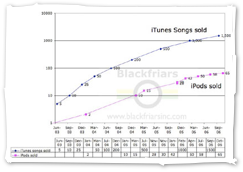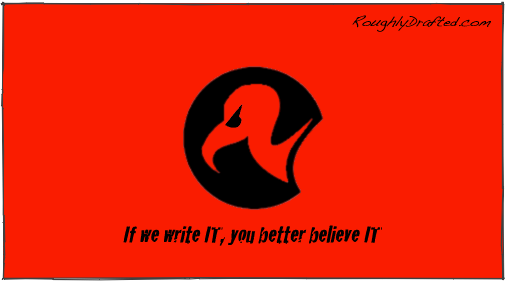
The Register’s 'Collapsing iTunes Store' Myth
Andrew Orlowski of the Register recently launched an opinion piece that cast fear, uncertainty, and doubt upon music sales through iTunes, announcing that the service has "experienced a collapse in sales revenues this year."
Orlowski based his ideas on numbers pulled from a Forrester research study, but interestingly, did not seek comment from Apple. While Forrester's research was based on a limited number of customer's credit card records, Apple has a bit tighter grasp on how much it actually sells through iTunes. 

Why didn't Orlowski ask Apple for comment on the data? Because he knew the numbers he extracted to create this new myth didn’t really paint the picture he implied they did; in fact, his article even pointed out that Forrester's Josh Bernoff "warned against extrapolating too much from the figures."
Despite the warning, Orlowski ran with the data and drew a set of misleading conclusions from it. The point was not just to create a sensationalist article, but to use it as proof for later articles that followed a preset agenda: iTunes can't succeed, because Orlowski has other ideas in mind about how to distribute the world's music.
It's the Register, OK
Orlowski, in San Francisco, writes for The Register, a British web site that is the tech world's equivalent to the Onion, but instead of being funny, it's more flamboyantly sarcastic. The Register appears to be a news site on first glance, but it’s really a tabloid style set of editorials that aim at being offensive more than informative.
One of the founders of the Register left to start the Inquirer, which uses an identical layout and style to print tech industry gossip and rumors. It serves up a heavy dose of sensationalist headlines as well, under the tagline “... facts and friction.” To be fair, the Inquirer is actually slightly more shrill.
While nobody cites the Inquirer, the Register has somehow retained enough credibility to used as a frequent source for Wikipedia articles. The Register generally presents Wikipedia as being unreliable and full of errors. That makes the two the butt of each other’s jokes, without either really intending it to be funny.


No Stranger to Myth
It was the Register that invented the "Apple will die from the Osborne Effect Myth," which intended to instill panic that Apple's Mac sales would tank long before the company could ever release Intel Macs. Somewhat ironically, Wikipedia rewrote history to present the Register as having liberated the world from this myth instead. Pshaw.
The Register also has been--along with other news outlets that readily print any press release as news--a major conduit for Greenpeace's lies about Apple's environmental record.
The Register also signed up to spread Tom Yager’s panic mongering that Apple was closing the Darwin kernel to stop pirates. Sites like the Register don’t just spread erroneous ideas and rumors for fun, they do it to support the outrageous conclusions they have already made.
The Blanket License Manifesto
Orlowski needed a myth to create panic in iTunes sales because his personal view of the future of digital music is a socialist paradise where everyone is taxed, the proceeds all go to the RIAA, and users are allowed to return to the 90s method of digging through Napster-like sites looking for music ripped and tagged by the proletariat.
It's all legal under his "blanket license" deal, where workers have Soviet style choice: join the collective or die trying to escape the iron curtain, er, blanket. It’s like WMA, but run by the government instead of Microsoft.
All this fervor for socialist music distribution has Orlowski in a fit frantic rage at the success of the capitalistic Apple and the bourgeois who shop online and pay for things they like in free markets.
The day after issuing his proof that iTunes had collapsed, Orlowski unsurprisingly printed a followup article bringing up his blanket license manifesto. In his great leap forward for music, the RIAA is established as a Supreme Soviet and all songs are redistributed to the people, who now supposedly own entertainment collectively.
That means no pesky DRM nor any "RIAA stormtroopers," because there will be nothing to police, apparently. Instead, you will "be able to walk past a cafe or store and 'collect' the music on your phone."
And you'll like it, or else...
Seeing Red in the Socialist Paradise
There's few problems with this socialist fantasy. First, the very person who feeds Orlowski his ideas of Blanket License Economics also "suggested that CDs will go up in price as a consequence of a P2P flat fee." Then of course, there's the flat fee itself. Yikes Chairman Orlowski, the revolution is looking like an expensive mistake.
But wait, even ignoring the costs involved, does this plan even make sense? Rather than having a market set prices based on supply and demand, we're going to let the RIAA simply fix prices it deems in the public interest?
That didn't work so well in Soviet Russia, and President Nixon did not have great experiences with setting prices to stop inflation here in the US either. If we have to live through the 1970s again, just to get back to the 90s and Napster, please let me off this crazy planet.
Myth, Interrupted
Beyond simple logic, the most crushing blow to the Register's Collapsing iTunes Store Myth was a reality check from Apple. Recall that Orlowski cited no comment from Apple in his first article. Oops.
Real facts would have been problematic in establishing a need for a Supreme RIAA with taxation powers, allowing us to trade around our songs "freely," while forcing everyone to pay for the privilege via convenient paycheck deductions, whether they use music online or not.
While Orlowski was busy printing his revolution followup article, Apple simply issued a statement saying the claims of collapsed sales were inaccurate. 

Apple doesn't report individual sales on demand, but anyone paying attention to Apple's recent press releases could simply chart them and see that sales are not collapsing at all, but rather have been experiencing a sustained increase.
Carl Howe of Blackfriar's Marketing did just that, charting both iPod and iTunes sales. He concluded, "The bottom line: anyone who claims sales are collapsing can't do basic math."
Finding Forrester
It's not hard to see why Orlowski was happy to discover a set of numbers suggesting the collapse of free market music sales, and why he subsequently ignored all other information in order to have an opportunity to write about his affinity for socialized music. But how did Forrester come up with figures that could be used to support such an idea?
Simple answer: by only looking at one narrow angle of a small subset of the iPod population.
Forrester's data came from 7000 participating users, less than half of whom even used the iTunes Store. Further, the figures looked only at those users' credit card transactions.
The problem is that a significant chunk of iTunes Store sales comes from gift cards, PayPal, and "iTunes Allowance" and other gift certificates. Most kids don't have credit cards. Further, the popularity of iTunes prepaid cards as gifts means that a lot of people are buying from iTunes without Visa and Mastercard ever knowing it.
If Forrester's data is correct, it may mean that iTunes users are indeed using direct credit cards purchases less in the iTunes Store, but jumping to the conclusion that iTunes is dying is an idea that the facts clearly don't support.
The iTunes Vendor Lock In Myth
While Orlowski's banged on Paul Thurrott’s iTunes failure drum primarily to suit his fantasy of socialized music, others were giddy at the prospect of iTunes collapse because of a related myth: the iTunes Vendor Lock In Myth.
Proponents of this myth worry that Apple's FairPlay is unfairly locking Microsoft, Real, and Sony out of the market for digital music by blocking their efforts to push their own DRM systems on iPod users.
Next Article:
This Series










Friday, December 15, 2006




 Bookmark on Del.icio.us
Bookmark on Del.icio.us Discuss on Reddit
Discuss on Reddit Critically review on NewsTrust
Critically review on NewsTrust Forward to Friends
Forward to Friends
 Get RSS Feed
Get RSS Feed Download RSS Widget
Download RSS Widget





